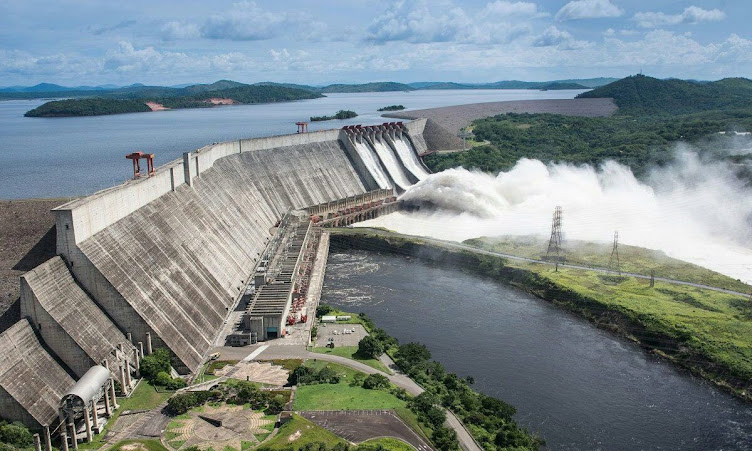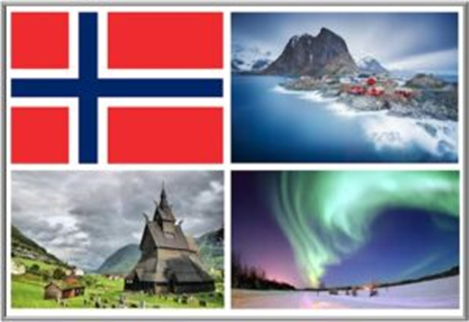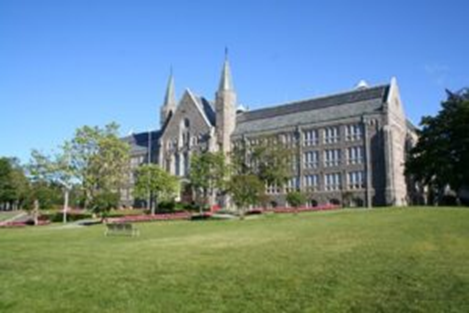Lessons for the reconstruction of Venezuela
Lifestyle. System of Justice and Guarantee of Compliance with Laws. Development Model and Long-term Strategic Planning for a Sustainable Economy. Work, activity that dignifies and exalts the nation.
Between
1983 and 1986, I had the privilege of studying at the University of Trondheim,
now known as the Norwegian University of Science and Technology (NTNU). This experience
provided me with a unique perspective on Norway, particularly regarding its way
of life and development model. During that period, I was able to engage in
discussions that helped me clarify which development model would be most
suitable for Venezuela.
Norwegian University of Science and Technology, NTNU
In Norway,
education instills core values from an early age, such as honesty, which is
deeply ingrained in their culture and way of life. This ethical foundation is
reflected in their value system, with a central focus on the well-being of
individuals, society, the environment, the nation, and the world at large. The
overarching aim is to foster harmonious coexistence and peace.
Values and principles for basic education
Values and principles for basic education are part of the curriculum, and it is determined by royal resolution on 1 September 2017 based on the Education Act § 1-5.
The main part applies to basic education in Norway. Basic education consists of primary school and upper secondary education. It thus includes the education children and young people receive from the first grade of primary school up to and including study preparation and vocational education programs in upper secondary education, where parts of the education take place in business and working life.
Human dignity
The school shall ensure that human dignity and the values that support it are used as a basis for the education and the entire activity.
The purpose clause is based on the inviolability of human dignity and that all human beings are equally valuable, regardless of what else separates us. When teachers show care for students and see the individual, human dignity is recognized as a fundamental value for the school and society.
Human rights have their basis in human dignity and are an important part of the foundation of the rule of law.
They are based on universal values that apply to everyone no matter who they are, where they come from and where they are. The Convention on the Rights of the Child is part of human rights and gives children and young people special protection. The education must be in accordance with human rights, at the same time as the students must acquire knowledge about human rights.
Democracy and participation
The school will give students the opportunity to participate and to learn what democracy means in practice.
The training shall promote support for democratic values and democracy as a form of government. It should give students an understanding of the rules of democracy and the importance of upholding them. Participating in society means respecting and endorsing fundamental democratic values such as mutual respect, tolerance, the individual’s freedom of belief and expression and free choice. Democratic values must be promoted through active participation in the entire training process.
The school shall promote democratic values and attitudes as a counterweight to prejudice and discrimination. The school must also create respect for the fact that people are different, and the students must learn to resolve conflicts in a peaceful way.
A democratic society is based on the entire population having equal rights and opportunities to participate in decision-making processes. The protection of the minority is a crucial principle in a democratic state governed by the rule of law and a democratic society.
A democratic society also protects indigenous peoples and minorities. The indigenous peoples ‘perspective is part of the students’ democracy education. All participants in the school community must develop awareness of both minority and majority perspectives and create space for cooperation, dialogue, and dissent. The work of cultivating diversity on the one hand and including the individual on the other requires a conscious view of values and the exercise of professional judgment.
The school should be a place where children and young people experience democracy in practice. The students must experience that they are listened to in everyday school life, that they have a real influence, and that they can influence what concerns them. They will gain experience with and practice various forms of democratic participation, both in the daily work in the subjects and through, for example, student councils and other council bodies. The dialogue between teacher and student, and between school and home, must be based on mutual respect. When students’ voices are heard in school, they experience how they can make their own conscious choices. Such experiences have value here and now and prepare students to become responsible citizens.
Accompanying this process, the solid Norwegian Justice System leads to the respect, strengthening and consolidation of values. To have values, one must not only count on the good education at home and at school. To coexist harmoniously in society, values also depend on an Adequate Justice System and the guarantee of compliance with laws.
Norway ranks as the fifth least corrupt country in the world, mainly because its legislation punishes corruption very harshly. Its Penal Code imposes sentences of up to 10 years in prison for crimes such as breach of trust, active and passive bribery, or money laundering, even if committed abroad. In addition, Norway enjoys the best press freedom index in the world, according to data from Reporters Without Borders.
When the goal is to live together in peace, around it all economic, political, and social aspects develop in a very healthy way, where solidarity is inside and outside the borders, where the forecasts are established so that there are no surprises in decades in the long run. In long-term country planning, as is the case of Norway, in more than half a century no major surprises have been observed in the economic or social scenarios. Assertive Development Planning is essential to consolidate the guarantee of respect and peace.
In modern history, Norway has not shown the world, inside or outside its borders, any profile close to that of a country with opportunistic intentions of taking advantage of other countries to the detriment of their inhabitants. Rather, it has always supported and offered its solidarity to the countries of the world with the greatest difficulties.
The social development achieved by Norway represents a much higher scale of living standards than those achieved by countries in Europe, Asia, the United States, Japan, China, Russia. Given its level of long-term planning, Norwegians do not suffer from the consequences of economic crises. There are no surprises. Everything is planned to have the human being, society, and peace in focus.
Norwegian National Day
Norwegians celebrate their national day differently than other countries. It is not a military parade where war power is exhibited with the presence of soldiers, tanks, and weapons of war.
May 17 is the quintessential children’s day, having the school as a natural centre with the flag hoist in the schoolyard, the school parades behind the banner of the respective centre, and the various types of games and entertainments in those involving teachers and parents. Dressed in a combination of red or blue, depending on the orientation of their studies, they are a colorful element of the celebration of May 17.
That day, people wear spring clothes, but the characteristic is to wear the bunad, a typical regional costume. Each of the regions has its own costume and the Norwegians mark, with this festive outfit, their identity, and their local and national belonging.
Norway, Energy, and Oil
The association of Norway’s standard of living with the development of its oil industry has recently been observed in the content of some opinion and information articles. It is important to emphasize that the standard of living, economic and social development achieved by the Norwegian society, never depended, nor has it depended, on its oil industry.
In the same way as the economic development of its neighbors, Sweden, Finland, and Denmark, its development was always based on the strengthening of the various areas of its economy, in the different regions of its geography. Its development, in addition to natural resources, has been based on work, thereby achieving the highest levels of quality of life on the planet. As reported by the Norwegian state, more than 90% of all profits from oil income, that is, more than one trillion dollars, is part of the Government’s Global Pension Fund, not to be used at present, but to reserve it for the pensions of future generations.
Dr Svein Richard Brandtzæg*, a Norwegian friend who was a classmate during my studies at the University of Trondheim, once sent me the following message:
“Norway, as you point out, saved the oil money for later use. We know that oil resources will be depleted, and by then, it is important that we are not finished in an economy that does not have the platform to sustain itself.”
*Dr Svein Richard Brandtzæg:
- From 2009 to 2019, President and CEO of Norsk Hydro ASA, a Global and Integrated Energy and Aluminium Company with 36,000 employees in 40 countries
- From 2014 to 2020, Chairman of the Board of Directors of the Norwegian University of Science and Technology, NTNU
Chairman of the Council of Ethics for the Norwegian Wealth Fund
As a reference, there are some similarities between Norway and Venezuela regarding the economic area, as both countries have been important producers of oil and aluminium, as well as important generators of hydroelectric power, aspects that we consider fundamental for the economic recovery of Venezuela.
CLEAN ENERGIES IN NORWAY
Since the late 1800s, Norway has generated most of its electricity from hydropower. More than 99% of electricity production in mainland Norway comes from hydroelectric plants.
Although hydroelectric power is dominant in Norway, the planning of productive and service sectors is not only focused on their immediate basic needs, but also on making the most of all the opportunities and potentialities the country has, as well as on the innovative capacity of its people, in this case, for the development of other renewable energies and technologies to make them work at their optimum level. Norwegian companies are pioneering in other areas: solar energy, marine energy, bioenergy production from wood, and energy storage.
GREEN HYDROGEN
This technology is based on the generation of hydrogen through an electrochemical process known as electrolysis. This method uses electric current to separate the hydrogen from the oxygen in water, thus electricity is obtained from renewable sources, producing energy without emitting carbon dioxide into the atmosphere.
In Norway, as part of Hydro’s strategic direction to strengthen its position in low-carbon aluminium and explore new growth opportunities within new energy sources, a green hydrogen company was established in early 2021 that will enable the change of hydrogen gas based on renewable energies in several of Hydro’s aluminium complexes, in addition to developing and serving the foreign market.
NORWAY AND CLIMATE CHANGE
Currently in all countries facing the global climate crisis, there is a substantial shift towards renewable energy sources as an environmentally sustainable alternative for power generation.
The following are the objectives that Norway has set itself with respect to climate change:
- reduce emissions of harmful greenhouse gases and keep the increase in the planet’s surface temperature below 2˚C, the goal being to limit the increase in global warming to 1.5˚C
- place the most vulnerable countries in a position to adapt to climate change
- prevent the consequences of climate and natural disasters
- prevent deforestation and thus reduce emissions of harmful greenhouse gases
- ensure economic development and food security in the future
The following are the contributions provided by Norway for the fulfillment of the objectives:
- supports the implementation of the Paris Agreement, the United Nations Sustainable Development Goals, and the Sendai Framework for Disaster Risk Reduction, all negotiated by UN member states
- foresees the reduction of its own greenhouse gas emissions by 40 percent between now and 2030
- contributes funds to international efforts against climate change through the Green Climate Fund (GCF, Global Environment Facility (GEF), the World Bank and and other funds and multilateral partners
- is at the forefront of international engagement in the field of health and climate
- promotes the gradual elimination of fossil fuel subsidies
- favours sustainable urban development and the development of renewable energies, to promote sustainable social development and economic growth
- contributes to the sustainable management of marine resources
Renewable energies are decisive
The energy sector accounts for more than 60 percent of greenhouse gas emissions. Therefore, access to renewable energy is key to sustainable development.














No comments:
Post a Comment